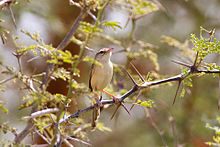
The Lac de Guiers or Lake Guiers is a lake in northern Senegal, south of the city of Richard-Toll and in the Louga and Saint-Louis regions. It is a chief source of fresh water for the city of Dakar, hundreds of kilometers to the south-west, through underground pipes.

Prinia is a genus of small insectivorous birds belonging to the passerine bird family Cisticolidae. They were at one time classed in the Old World warbler family, Sylviidae.

The river warbler is an Old World warbler in the grass warbler genus Locustella. It breeds in eastern and central Europe, and into the western Palearctic. It is migratory, wintering in inland southern Africa, from around the Zambezi River south to the vicinity of Pretoria in South Africa. The genus name Locustella is from Latin and is a diminutive of locusta, "grasshopper". This refers to the song of the common grasshopper warbler and some others in this genus. The specific fluviatilis is Latin for "of a river".

The plain prinia, also known as the plain wren-warbler or white-browed wren-warbler, is a small cisticolid warbler found in southeast Asia. It is a resident breeder from Pakistan and India to south China and southeast Asia. It was formerly included in the tawny-flanked prinia, resident in Africa south of the Sahara. The two are now usually considered to be separate species.

The tawny-flanked prinia is a small passerine bird belonging to the genus Prinia in the family Cisticolidae, a family of Old World warblers. It is widespread and common in most parts of Africa south of the Sahara. The plain prinia of southern Asia was formerly included in this species but is now usually considered to be a separate species.

The graceful prinia is a small warbler. This prinia is a resident breeder in northeastern Africa and southern Asia, from Egypt and Somalia east to Saudi Arabia, where it is sometimes called streaked wren-warbler.

The European perch, also known as the common perch, redfin perch, big-scaled redfin, English perch, Euro perch, Eurasian perch, Eurasian river perch, Hatch, poor man’s rockfish or in Anglophone parts of Europe, simply the perch, is a predatory species of the freshwater perch native to Europe and northern Asia. The species is a popular quarry for anglers, and has been widely introduced beyond its native area, into Australia, New Zealand and South Africa. They have caused substantial damage to native fish populations in Australia and have been proclaimed a noxious species in New South Wales.
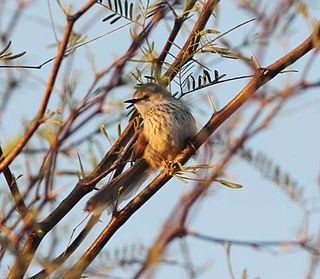
The Namaqua warbler, also known as the Namaqua prinia or white-breasted prinia, is a small passerine bird, a cisticolid warbler and the sole member of the genus Phragmacia. It was formerly placed in the genus Prinia, but was found to be sufficiently distinct to warrant a genus of its own.

The red-winged prinia or the red-winged warbler is a bird species in the family Cisticolidae. It formerly belonged in the monotypic genus Heliolais. It is found in Benin, Burkina Faso, Cameroon, Central African Republic, Chad, Democratic Republic of the Congo, Ivory Coast, Ethiopia, Gambia, Ghana, Guinea, Guinea-Bissau, Kenya, Liberia, Malawi, Mali, Mozambique, Niger, Nigeria, Senegal, Sierra Leone, Sudan, Tanzania, Togo, Uganda, Zambia, and Zimbabwe, where its natural habitat is dry savanna.
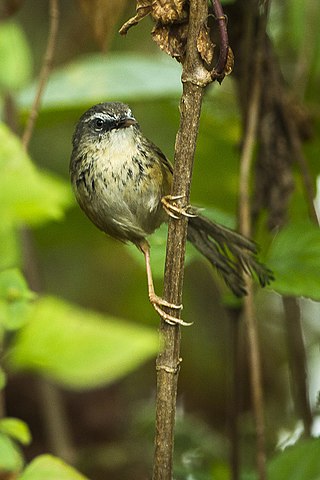
The hill prinia is a species of passerine bird in the family Cisticolidae.
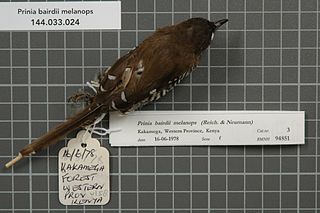
The banded prinia is a species of bird in the family Cisticolidae.

The rufous-fronted prinia is a species of bird in the family Cisticolidae. It is found in India and Pakistan. Its natural habitat is subtropical or tropical dry forest.

The grey-crowned prinia is a species of bird in the family Cisticolidae. It is found in Bhutan, northern India and Nepal. Its natural habitats are subtropical or tropical dry forest, subtropical or tropical moist shrubland, subtropical or tropical dry lowland grassland, subtropical or tropical seasonally wet or flooded lowland grassland, and arable land. It is threatened by habitat loss.

The Himalayan prinia is a species of bird in the family Cisticolidae. It was formerly lumped in with the striped prinia as the striated prinia.

The bar-winged prinia is a species of bird in the cisticola family Cisticolidae. The species is sometimes known as the bar-winged wren-warbler.

The black-chested prinia is a species of bird in the family Cisticolidae. It is found in Angola, Botswana, Lesotho, Namibia, South Africa, Zambia, and Zimbabwe. Its natural habitat is dry savanna.

The yellow-bellied prinia is a species of bird in the family Cisticolidae. It is found in Pakistan, the southern Himalayan foothills, the northeastern Indian subcontinent, and Southeast Asia.

The Sierra Leone prinia, also known as the white-eyed prinia, is a species of bird in the family Cisticolidae. It is found in Ivory Coast, Guinea, Liberia, and Sierra Leone. Its natural habitat is thickets and forest edge, especially in the transition zone between submontane forest and submontane grassland. It is threatened by habitat loss, especially habitat clearance to establish iron ore mines.
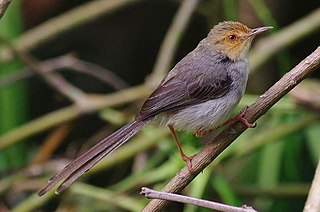
The São Tomé prinia is a species of bird in the family Cisticolidae. It is endemic to São Tomé and Príncipe and is found in the island of São Tomé. Its natural habitats are subtropical or tropical moist montane forest and subtropical or tropical moist shrubland. The species was named by José Vicente Barbosa du Bocage in 1887.

The rufescent prinia is a species of bird in the family Cisticolidae. It is found in Southeast Asia, the Indian subcontinent and southern Yunnan. Its natural habitat is subtropical or tropical dry forest.
